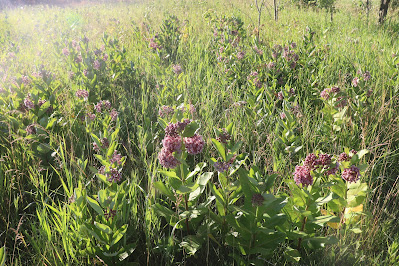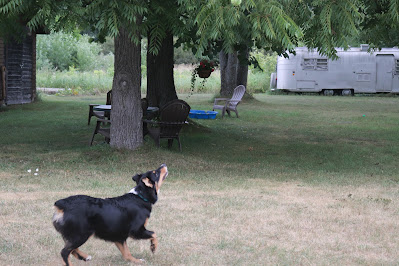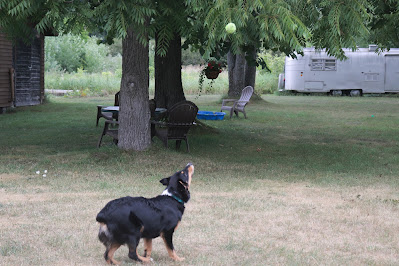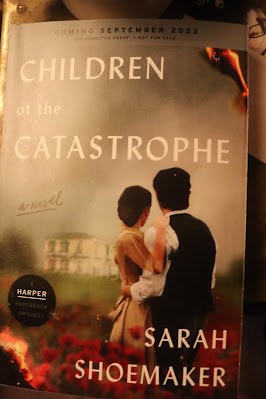 |
| Soon coneflowers, later asters |
There are days, I’ll admit, when getting the garbage bagged and out to the highway for early morning weekly pickup feels like a major accomplishment. That is, sometimes I feel competent and close to confident; other times life seems overwhelming and almost impossible. But yes, the puppy. Or, as I say when she jumps up and catches a tennis ball in the air after one bounce, “Yes, the puppy!!!” She is very athletic. And she is a reason, every morning, to get out of bed and outdoors, and once we are outdoors, I am happy to hear bees humming in the linden trees, to get busy digging new garden beds between throws of that tennis ball (or a Frisbee or just an ordinary stick), and after we work and play a while in the yard, we go back on the porch for breakfast, and she doesn’t seem to mind if I pick up a book for 15 minutes or so before we go outside again.
 |
| We think a deer slept here. |
This has been a big week for Sunny and me. For starters, a couple of companies were doing autumn olive removal and eradication in our immediate neighborhood, and I signed up to have my meadow cleared of the scourge. I used to do it myself, spending two full days out there every June (here is a post from back in the old days when I regularly and actively managed the meadow myself), but something (age) happened along the way, and now it’s more than I can manage and three years since I last waged battle. Amazing how much faster four young guys with power tools can do a job than an old lady with hand tools! They were done before noon and did just what I wanted – no mowing, no clear-cutting, only the autumn olive taken out – so my meadow is still a wildlife paradise of native grasses, wildflowers, young trees, and lots and lots of milkweed. If in time it reverts to woodland, I can live with that, but I definitely could not live surrounded by an impenetrable thicket of autumn olive, so it feels great to have that job done.
 |
| For future generations of monarch butterflies -- |
What does Sunny Juliet care about autumn olive? Why was that part of a big week for her? Okay, you got me there. She didn’t care about eradication of an invasive plant species at all, but she was thrilled to meet the crew! Very excited to introduce herself, so to speak! When she first ran up the driveway to investigate (they were working for the neighbors that day), the guys made jokes about who was in charge, Sunny Juliet or me, but when I got her leashed and sitting and then even lying down, one of them said, “You’ve trained dogs before, haven’t you?” Well, never one as challenging as Sunny, but we are coming along, step by step.
Friends stopped by on Sunday and again on Wednesday, and once again Sunny was challenged -- or I was, more to the point. She is very sociable, which is good; it’s the jumping we need to eliminate. She does, however, sit when told to sit and can be redirected with a toy or a treat, and so, aided by plenty of “high-value” treats, she did much better in puppy class this week than last, too. She is learning not to pull on her leash like a maniac every time the instructor approaches or another dog barks. Progress! Impulse control!
I am also making progress in my reading of Progress and Poverty, by Henry George, and am happy to have at least one friend as excited about the book as I am. George’s arguments and ideas are different and exciting, but my friend and I are also enamored with his use of language. Here is an example:
Poverty is the Slough of Despond which Bunyan saw in his dream, and into which good books may be tossed forever without result. To make people industrious, prudent, skillful, and intelligent, they must be relieved from want. If you would have the slave show the virtues of the freeman, you must first make him free.
- Henry George, Progress and Poverty
I’m happy to have discovered recently nature writer Heather Durham and to have in stock now two of her books, Wolf Tree and Going Feral: Field Notes on Wonder and Wanderlust, and I’m also happy to have the new issue of the Dunes Review here at last. Between new books and old, there is something “new” at my bookstore almost every day, so my days are never boring at work – and with a lively young puppy to train, mornings and evenings at home are never boring, either. Exhausting, sometimes, but never boring.
Then there is my exciting bedtime reading, bound galleys of a novel to be released right after Labor Day, Children of the Catastrophe, by Sarah Shoemaker (you remember her wonder Mr. Rochester), a family story set in early 20th-century Smyrna (site of present-day Izmir), and you will be hearing a lot more about that book from me in the weeks to come. As for Dog Ears Books, which opened down south on Waukazoo Street from its current location in 1993, we are now, as of July 2022, launched into our 30th year. (Sometimes it pays to be stubborn through the hard times, even if it means hanging on by your fingernails.) Please note that this will be the final summer for my late husband's gallery, next door to my bookstore. He died with his boots on, never retired.











